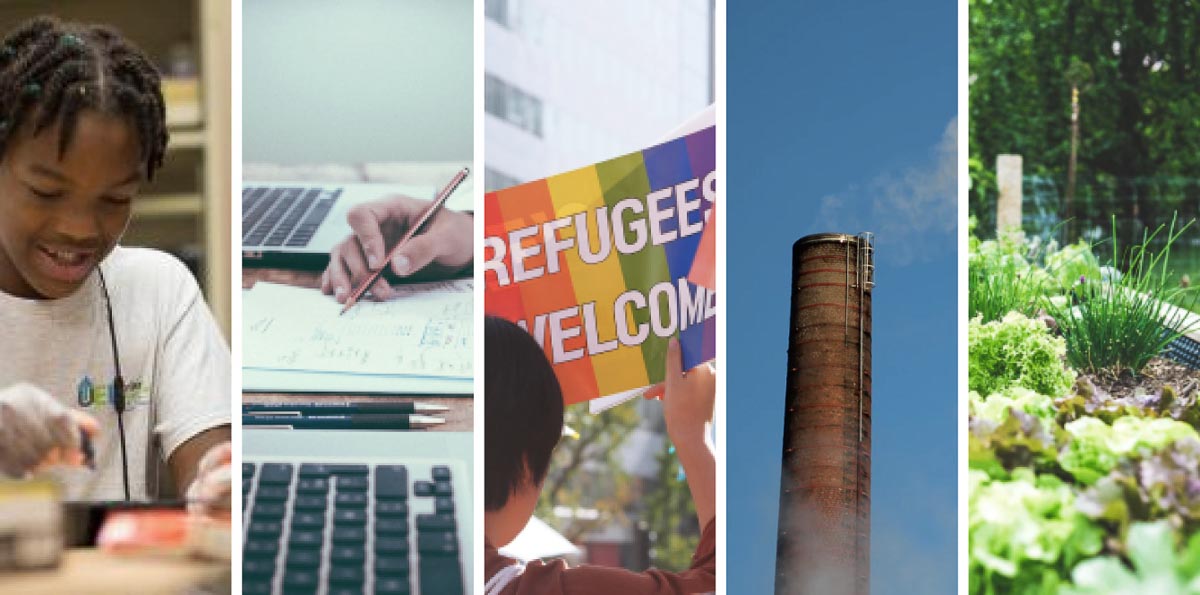The COVID-19 pandemic not only laid bare extant inequalities but also exacerbated them. Winter storm Uri only further highlighted the reality that the dire consequences of natural disasters are not equally distributed across neighborhoods.
As state and city officials have worked to address the ongoing threat of the pandemic and the fallout from the winter storm, many nonprofits have been on the frontlines of helping vulnerable communities. Organizations like our Community Bridges partners have not only provided tangible resources to needy individuals but also advocated on behalf of those most affected by COVID-19.
This is by no means a new role for nonprofits, which have been increasingly tasked with serving the poor over the past 30 years. But community organizations have also faced unprecedented challenges. Indeed, to be a “community” organization took on new meaning in a time where social distancing was the norm and social isolation was an ever-present risk.
The 2020-2021 Community Bridges Fellows played an instrumental role in helping our local community partners adapt to these new norms and challenges to serve the neediest Houston residents. The Kinder Institute’s Community Bridges Program, which will soon complete its 10th year, pairs the academic study of urban inequality with fieldwork at Houston-area nonprofits.
As part of their fieldwork, Community Bridges fellows complete research-driven projects designed not only to benefit local organizations but also strengthen disadvantaged communities in the Greater Houston area. Over a period of 9 months, our students completed five credit hours of courses on urban inequality, volunteered 5-7 hours a week with one of our partner organizations, and completed a research project designed to assist those partners in making evidence-based decisions about how to best serve local communities.
Our community partner organizations focus on a variety of issues, ranging from refugee resettlement to early childhood education. Thus, the projects completed by our Community Bridges Fellows tackled an array of challenges facing Houston residents.
Flora Park, for example, worked with Legacy Community Health. Flora’s project looked at the challenges facing pregnant women in accessing health care when they have limited access to transportation. What Flora found is that Legacy patients who were transportation insecure—meaning they had inadequate access to reliable transportation—were significantly less likely than other patients to attend post-partum appointments with their physician.
Another one of our fellows, Anthony D’Souza worked with Air Alliance Houston to examine industrial separation distances. While other countries throughout the world utilize these buffer zones to protect residents from the potentially harmful consequences of living in proximity to industrial sites, the U.S. does not require such separation distances. As Anthony demonstrates, the consequences of this lack of oversight means that disadvantaged and non-white residents in places like Houston are disproportionately at risk of experiencing the harmful health consequences of living close to environmental hazards.
While our students researched a wide variety of topics and utilized different methodologies, they shared a deep concern and empirical focus on addressing urban inequalities. Tanvi Jadhav worked with YES Prep Fifth Ward to explore an issue facing charter schools: access to athletic facilities. By mapping potential sites for athletic teams from YES Prep to utilize for athletic practices, Tanvi highlights the implications of a lack of public green space in communities like the Fifth Ward.
The project completed by another one of our fellows, Nilka Montero, also sheds light on the consequences of an oft-ignored issue. In her interviews with boys involved in the Urban Enrichment Institute, Nilka found that most of them felt like they were unable to talk about their culture at school. By making clear recommendations of how organizations like UEI can help provide culturally-relevant teaching to Black and Latino boys, Nilka’s project also provides a blueprint for other types of academic institutions serving Black and Latino communities.
I would love to tell you about the projects completed by all 21 of our student fellows. But, I would rather you hear about the importance and implications of their projects in their own words. We have created a showcase of student work where you can find 3-minute videos created by our fellows to explain their projects as well as infographics highlighting their key findings.
While the past year has certainly highlighted the inequalities that exist in cities like Houston, it has also underscored the importance of programs like Community Bridges. By completing academic coursework alongside weekly fieldwork, our students were able to gain a better understanding of why inequality exists and how it might be addressed.
The hope of the students is not just to address temporary issues but to promote sustainable change through our community partners. As the Community Bridges instructor, I am confident that the influence of the program will go far beyond the confines of the 2020-2021 school year for our students. I have seen this firsthand already; several of our students have continued to work with our community partners through our summer fellowship program or simply out of a desire to stay involved in the Houston community.
The pandemic certainly presented many new challenges, but it also galvanized a group of Rice students to address those challenges through their involvement in Community Bridges.
Dan Bolger is a Ph.D. candidate in the Department of Sociology at Rice University and the course instructor for the Community Bridges program.

